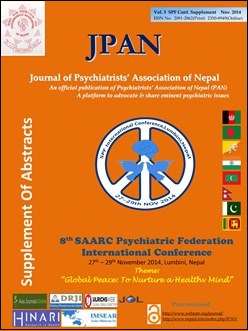Existential Psychology & Buddha Philosophy: It's Relevance in Nurturing a Healthy Mind
DOI:
https://doi.org/10.3126/jpan.v3i3.11836Keywords:
Existential Psychology, Buddha Philosophy, DepressionAbstract
The term "existentialism" have been coined by the French philosopher Gabriel Marcel in the mid-1940s and adopted by Jean-Paul Sartre. The label has been applied retrospectively to philosophers like Martin Heidegger, Karl Jaspers and Søren Kierkegaard and other 19th and 20th century philosophers who, despite profound doctrinal differences, generally held that the focus of philosophical thought should be to deal with the conditions of existence of the individual person and his or her emotions, actions, responsibilities, and thoughts.
The early 19th century philosopher Søren Kierkegaard, posthumously regarded as ‘the father of existentialism’, maintained that the individual solely has the responsibilities of giving one's own life meaning and living that life passionately and sincerely, in spite of many existential obstacles and distractions including despair, angst, absurdity, alienation, and boredom.
Over the last century, experts have written on many commonalities between Buddhism and various branches of modern western psychology like phenomenological psychology, psychoanalytical psychotherapy, humanistic psychology, cognitive psychology and existential psychology. In comparison to other branches of psychology, less have been studied and talked on the commonalities between Buddhist philosophy and modern existential psychology that have been propagated in the west.
Buddha said that the life is ‘suffering’. Existential psychology speaks of ontological anxiety (dread, angst). Buddha said that ‘suffering is due to attachment’. Existential psychology also has some similar concepts. We cling to things in the hopes that they will provide us with a certain benefit. Buddha said that ‘suffering can be extinguished’. The Buddhist concept of nirvana is quite similar to the existentialists' freedom. Freedom has, in fact, been used in Buddhism in the context of freedom from rebirth or freedom from the effects of karma. For the existentialist, freedom is a fact of our being, one which we often ignore. Finally, Buddha says that ‘there is a way to extinguish suffering’. For the existential psychologist, the therapist must take an assertive role in helping the client become aware of the reality of his or her suffering and its roots.
As a practising psychiatrist, clinician, therapist we often face patients with symptoms of depression where aetiology is not merely a reactive one, not an interpersonal conflict, not simply a cognitive distortion! Patients mainly present with some form of personal ‘existential crisis’. Unless we understand and address these existential questions, we probably, will fail to alleviate the symptoms of depression, by merely prescribing drugs, in these patients!
Downloads
Downloads
Published
How to Cite
Issue
Section
License
This license enables reusers to distribute, remix, adapt, and build upon the material in any medium or format, so long as attribution is given to the creator. The license allows for commercial use.




